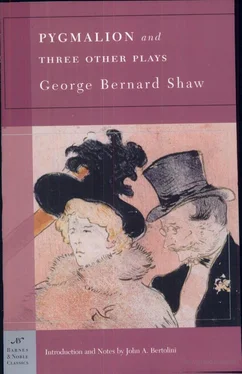Not only do these talented energetic people retain their self-respect through shameful misconduct: they do not even lose the respect of others, because their talents benefit and interest everybody, whilst their vices affect only a few. An actor, a painter, a composer, an author, may be as selfish as he likes without reproach from the public if only his art is superb; and he cannot fulfil this condition without sufficient effort and sacrifice to make him feel noble and martyred in spite of his selfishness. It may even happen that the selfishness of an artist may be a benefit to the public by enabling him to concentrate himself on their gratification with a recklessness of every other consideration that makes him highly dangerous to those about him. In sacrificing others to himself he is sacrificing them to the public he gratifies; and the public is quite content with that arrangement. The public actually has an interest in the artist’s vices.
It has no such interest in the surgeon’s vices. The surgeon’s art is exercised at its expense, not for its gratification. We do not go to the operating table as we go to the theatre, to the picture gallery, to the concert room, to be entertained and delighted: we go to be tormented and maimed, lest a worse thing should befall us. It is of the most extreme importance to us that the experts on whose assurance we face this horror and suffer this mutilation should have no interests but our own to think of; should judge our cases scientifically; and should feel about them kindly. Let us see what guarantees we have: first for the science, and then for the kindness.
ARE DOCTORS MEN OF SCIENCE?
I presume nobody will question the existence of a widely spread popular delusion that every doctor is a man of science. It is escaped only in the very small class which understands by science something more than conjuring with retorts and spirit lamps, magnets and microscopes, and discovering magical cures for disease. To a sufficiently ignorant man every captain of a trading schooner is a Galileo, every organ-grinder a Beethoven, every piano-tuner a Helmholtz, every Old Bailey barrister a Solon, every Seven Dials pigeon dealer a Darwin, every scrivener a Shakespear, every locomotive engine a miracle, and its driver no less wonderful than George Stephenson. {36} 36 2 (p. 181) every piano-tuner a Helmholtz, every Old Bailey barrister a Solon, every Seven Dials pigeon dealer a Darwin, ... every locomotive engine a miracle, and its driver no less wonderful than George Stephenson: Hermann L. F. von Helmholtz (1821-1894) was a renowned German physiologist and physicist; Old Bailey is London’s main criminal court building; Greek statesman Solon (c.600 B.C.), one of the Seven Wise Men of Greece, was renowned as a wise lawgiver; Seven Dials, a meeting point of seven roads in London and a poor area in Victorian times, is an unglamorous locale; English inventor George Stephenson (1781-1848) invented the railway locomotive engine.
As a matter of fact, the rank and file of doctors are no more scientific than their tailors; or, if you prefer to put it the reverse way, their tailors are no less scientific than they. Doctoring is an art, not a science: any layman who is interested in science sufficiently to take in one of the scientific journals and follow the literature of the scientific movement, knows more about it than those doctors (probably a large majority) who are not interested in it, and practise only to earn their bread. Doctoring is not even the art of keeping people in health (no doctor seems able to advise you what to eat any better than his grandmother or the nearest quack): it is the art of curing illnesses. It does happen exceptionally that a practising doctor makes a contribution to science (my play describes a very notable one); but it happens much oftener that he draws disastrous conclusions from his clinical experience because he has no conception of scientific method, and believes, like any rustic, that the handling of evidence and statistics needs no expertness. The distinction between a quack doctor and a qualified one is mainly that only the qualified one is authorized to sign death certificates, for which both sorts seem to have about equal occasion. Unqualified practitioners now make large incomes as hygienists, and are resorted to as frequently by cultivated amateur scientists who understand quite well what they are doing as by ignorant people who are simply dupes. Bone-setters make fortunes under the very noses of our greatest surgeons from educated and wealthy patients; and some of the most successful doctors on the register use quite heretical methods of treating disease, and have qualified themselves solely for convenience. Leaving out of account the village witches who prescribe spells and sell charms, the humblest professional healers in this country are the herbalists. These men wander through the fields on Sunday seeking for herbs with magic properties of curing disease, preventing childbirth, and the like. Each of them believes that he is on the verge of a great discovery, in which Virginia Snake Root will be an ingredient, heaven knows why! Virginia Snake Root fascinates the imagination of the herbalist as mercury used to fascinate the alchemists. On week days he keeps a shop in which he sells packets of pennyroyal, dandelion, &c., labelled with little lists of the diseases they are supposed to cure, and apparently do cure to the satisfaction of the people who keep on buying them. I have never been able to perceive any distinction between the science of the herbalist and that of the duly registered doctor. A relative of mine recently consulted a doctor about some of the ordinary symptoms which indicate the need for a holiday and a change. The doctor satisfied himself that the patient’s heart was a little depressed. Digitalis being a drug labelled as a heart specific by the profession, he promptly administered a stiff dose. Fortunately the patient was a hardy old lady who was not easily killed. She recovered with no worse result than her conversion to Christian Science, [99] Religion, founded in 1866 by Mary Baker Eddy, that eschews doctors in favor of spiritual healing.
which owes its vogue quite as much to public despair of doctors as to superstition. I am not, observe, here concerned with the question as to whether the dose of digitalis was judicious or not; the point is, that a farm laborer consulting a herbalist would have been treated in exactly the same way.
BACTERIOLOGY AS A SUPERSTITION
The smattering of science that all — even doctors — pick up from the ordinary newspapers nowadays only makes the doctor more dangerous than he used to be. Wise men used to take care to consult doctors qualified before 1860, who were usually contemptuous of or indifferent to the germ theory and bacteriological therapeutics; but now that these veterans have mostly retired or died, we are left in the hands of the generations which, having heard of microbes much as St. Thomas Aquinas heard of angels, suddenly concluded that the whole art of healing could be summed up in the formula: Find the microbe and kill it. And even that they did not know how to do. The simplest way to kill most microbes is to throw them into an open street or river and let the sun shine on them, which explains the fact that when great cities have recklessly thrown all their sewage into the open river the water has sometimes been cleaner twenty miles below the city than thirty miles above it. But doctors instinctively avoid all facts that are reassuring, and eagerly swallow those that make it a marvel that anyone could possibly survive three days in an atmosphere consisting mainly of countless pathogenic germs. They conceive microbes as immortal until slain by a germicide administered by a duly qualified medical man. All through Europe people are adjured, by public notices and even under legal penalties, not to throw their microbes into the sunshine, but to collect them carefully in a handkerchief; shield the handkerchief from the sun in the darkness and warmth of the pocket; and send it to a laundry to be mixed up with everybody elses’s handkerchiefs, with results only too familiar to local health authorities.
Читать дальше












